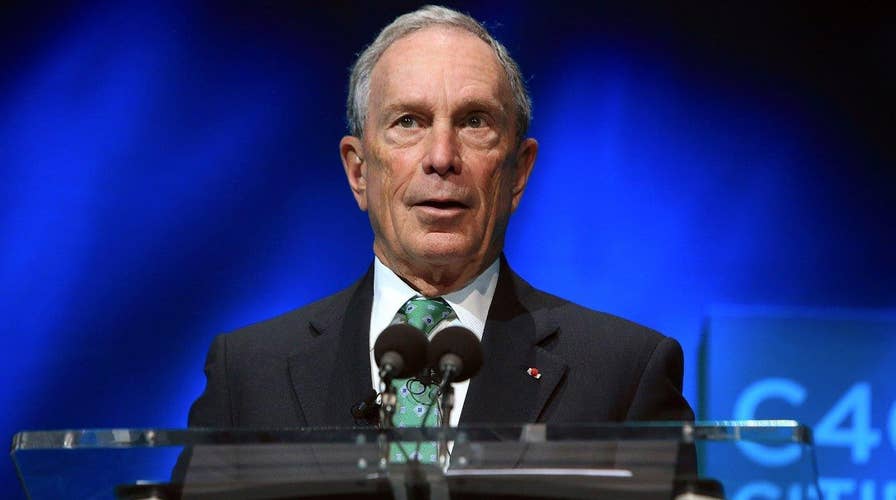How would a Bloomberg presidential run shake things up?
Strategy Room: Stephen Sigmund and Liz Peek on whether former NYC Mayor Michael Bloomberg just wants a voice in the 2016 presidential race
A potential Michael Bloomberg White House bid has sparked widespread speculation -- including what scenarios would trigger an independent run and whether Democrats or Republicans would be hurt the most.
But, in an election dominated by brash candidates, analysts still have serious doubts whether the billionaire businessman and ex-New York mayor could resonate with voters, at least like the other New York billionaire in the race.
“Voters who are looking for a center-left business tycoon to support in 2016 have already found their candidate, and his name is [Donald] Trump,” David Payne, a Republican strategist and partner at Vox Global, said, taking an implicit shot at the Republican front-runner. “There isn’t much room for Mike Bloomberg to run in this lane.”
Which lane he'd even run in is an open question. Once a Democrat, later a Republican and now an independent, Bloomberg's political history and positions are complicated.
Given his lately liberal reputation, a Trump spokeswoman suggested a Bloomberg bid would likely hurt Democrats by siphoning off their voters -- and ultimately help Republicans.
At the same time, Bloomberg reportedly has at least $1 billion of his own money to drop on the race, and may be eager to put up that war chest against Trump's in a battle of the billionaires, if Trump is the GOP nominee.
That is -- if he runs. Bloomberg has told political advisers to draft a presidential bid game plan and will decide whether to run in mid-March, based on the results of early primaries, according to a New York Times story Saturday.
But the 2016 candidates already have a roughly eight-month head start on fundraising and campaigning.
“His biggest problem will be the perception of a Johnny-come-lately,” said Douglas Smith, a partner at Kent Strategies who worked on presidential campaigns for Al Gore and Bill and Hillary Clinton. “And there are just so many hurdles.”
Further, no independent candidate has been elected U.S. president since George Washington.
The Bloomberg announcement resulted in a mostly unwelcoming response Sunday from the 2016 field, particularly from Democratic candidate Sen. Bernie Sanders.
“This country is moving away from democracy to oligarchy, that billionaires are the people who are controlling our political life,” Sanders, the Vermont senator running against Democratic front-runner Hillary Clinton, told ABC News. “That is not what, to my view, American democracy is supposed to be about, a contest between billionaires. If that takes place, I am confident that we will win it.”
Trump effectively dared him to get in. He told CBS News: “I would love it. He’s very opposite on me with guns, and he’s opposite on pro-life, and he’s opposite on a lot of things, so I would love to have Michael get in the race.”
Bloomberg’s policy stances cut across party lines. The 73-year-old Bloomberg supports charter schools, but is pro-choice on the issue of abortion and uses his financial and political strength to push for tougher gun-control laws, including support for the nonprofit Everytown for Gun Safety, which he helped start.
Analysts generally agree that Bloomberg would enter the race if Clinton suffers too many early-primary losses to Sanders, a self-proclaimed Democratic Socialist whose campaign message is about helping the poor and middle class.
“I’m going to …. get the nomination so he doesn’t have to,” Clinton assured in an interview with NBC News.
Republican candidate Marco Rubio told Fox News: "If he becomes a candidate, then we'll have a conversation about our differences. … As of now he's just a private citizen who owns a big company.”
Still, the debate continues about which party or candidate would be hit hardest by Bloomberg.
“With Trump so good at playing the changeling … combined with this week's statement that he intends to be a ‘politically correct’ president if he wins, Trump could certainly drive even his most ardent supporters into the arms of a third party,” Juleanna Glover, a Republican strategist and corporate consultant, said Monday. “Could that be Bloomberg? Maybe.”
Bloomberg, owner and chief executive of Bloomberg LP, a media and financial-data company, considered running for president in 2008 and 2012 and didn't, which could hurt his credibility with voters.
“If Bloomberg defies belief and actually runs, he might poach a few percent of Hillary Clinton’s voters,” Payne said. “But as an independent with a liberal position on virtually every issue at stake in this year’s election, his appeal to moderate and conservative voters will be negligible.”
Payne and others also suspect Bloomberg floating the bid idea is just another way for him to stay relevant.
“His latest statements could be aimed at generating fresh headlines and maintaining political influence," Payne said.
Rob Carter, a Republican strategist, thinks Bloomberg is indeed serious, after talking to people on his team.
"You have to pay attention to anybody somewhat known nationally willing to put $1 billion into this race," said Carter, a former finance chairman for the Maryland Republican Party. "I don't care how much money you have, that's a lot. ... He's probably thinking, 'A Sanders-Trump race. I've got to get in this thing.'"





















